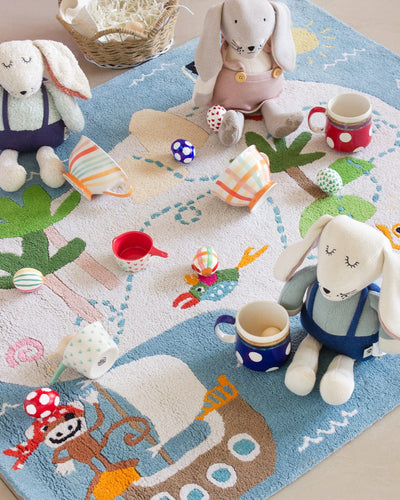What goldfish can teach us about business : The Delights of Distraction No.92
Table of contents
About five years after launching, The Wishing Chair was in expansion mode. In addition to our three outlets, we wanted to open brick-and-mortar stores in Mumbai, Hyderabad and Chandigarh. But most of our earnings were being plowed back into developing new designs and buying inventory, which meant we needed funding to buttress the capital costs of real estate and construction.
And so, off we went, fund-fishing, traipsing the proverbial Venture Capital rounds. After glancing over our P&L spreadsheets, we would almost always get the same reaction: “What were you doing for the last 5 years? You only have 3 stores, you should have 50 by now! You’re not growing fast enough.” Needless to say, we never got the funding. We were sent back to the chalkboard with our tails between our legs, wondering where we went wrong.
But then we learnt about goldfish. In an article by author and money-expert, Morgan Housel, explains what biologists from University of Glasgow found: “Take two groups of identical baby fish. Put one in abnormally cold water; the other in abnormally warm water. The fish living in cold water will grow slower than normal, while those in warm water will grow faster than normal. Put both groups back in regular temperature water and they’ll eventually converge to become normal, full-sized adults.
Then the magic happens.
Fish with slowed-down growth in their early days go on to live 30% longer than average. Those with artificial super-charged growth early on die 15% earlier than average. The cause isn’t complicated. Super-charged growth can cause permanent tissue damage and “may only be achieved by diversion of resources away from maintenance and repair of damaged biomolecules.” Slowed-down growth does the opposite, “allowing an increased allocation to maintenance and repair.”
The same is true of rats, of humans, of business.
Our growth was “slow” because we were learning the ropes, tweaking the business model, fixing the bottlenecks, figuring out ways to keep costs low and trying to maintain profitability. Now all we need's a little patience.
Just ask the goldfish!
Here’s our fave reads, links, and stuff we loved over the past week:
To read: Living in a country with one of the highest coefficients of income equality in the world, this was a fascinating, yet sobering read. A collection of research on the impact of wealth on our sense of empathy, moral judgement, addiction, happiness and love. “A UC Berkeley study found that in San Francisco – where the law requires that cars stop at crosswalks for pedestrians to pass – drivers of luxury cars were four times less likely than those in less expensive vehicles to stop and allow pedestrians the right of way. They were also more likely to cut off other drivers.” Considering the number of black BMWs that find themselves in the middle of unfortunate accidents in the capital, this behaviour seems true for New Delhi too.
And this as another interesting deep dive into the eating habits and “deprivation” lifestyles of CEOs and entrepreneurs in tech, analyzed through the lens of an anthropologist who surmises that this offbeat, weird behaviour only solidifies their mark as shamans of the modern world, capable of supernatural feats that would justify their cult status. “Quirks of psychology predispose us to accept that people who deviate from normal humans more tenably have special powers. Shamans, not necessarily knowingly, hack this cognitive foible to convince people of their extraordinary abilities.”
To joy scroll: “And yet, anyone who has ever held their camera up to the blazing sky knows that a brilliant firework show can rarely be captured to any satisfying degree. Perhaps this is what makes a nineteenth-century series of catalogue advertisements for Japanese fireworks so mesmerizing: denied the expectations of photorealism, these images are free to evoke a unique sense of visual wonder.”
Also - another series of works from Japan - Makoto Azuma a flower artist and the world’s first botanical sculptor. He works magic with flowers: lights them on fire, drops them out of airplanes, launches them into space, freezes them in ice blocks, and films them slowly dying, highlighting their ephemeral beauty but also their strength and resilience.
To self soothe: Sometimes when modern life gets too much to bear, perhaps you can have a gander at taking refuge in history podcasts. Escaping into the obscure world of another era, in another land long forgotten (except by droning BBC historians), might have some astonishing soothing effects. At least according to the author of this article: “At a time full of catastrophes, tragedies, and panics, I like to hear about long-gone catastrophes, tragedies, and panics, then learn how we overcame them, how we survived. History podcasts suggest that there are larger forces at work in this world and that, generally speaking, we are making advances, however slowly and painfully. The 21st century may be stressful, but it still beats the 13th century.”
To ponder: Some Medieval Japanese Buddhist Wisdom:
Yoshida Kenkō (1283 – 1350) was a Japanese Buddhist monk and poet, best known for his posthumously published collection of short statements and essays known as Essays in Idleness or The Harvest of Leisure that demonstrate the essence of the Way in Buddhism. Some quotes from these:
“Wisdom lies in understanding your own limits, and swiftly relinquishing what lies beyond reach.” “It harms a man more to wound his heart than to hurt his body.”
“Even people who seem eminently intelligent will judge others yet have no knowledge of themselves. It makes no sense to lack self-knowledge while understanding those around you. He who knows himself must be said to be the man of real knowledge”
To self reflect: Both of us really wish we got our respective fathers’ genes: the one which defines their devil-may-care, self-assured, carefree attitude to life. But we don’t have those genes. Instead we are incredibly anxious. We know we are anxious and we know the world isn’t going to crack into two - but for some reason, we can’t always quell it. It obviously feeds something in us. It might be the concept of: Omnipotent Fantasy. The belief and inherent desire, that we have more power over things than we actually do. For example: Believing we can save people in our life from their pain or believing that if we worry enough, then we can keep all the bad things at bay. Even though we would like to rid ourselves of the discomfort of anxiety, we cling to it for fear that when we stop worrying, our greatest fears will come true. Therefore to relieve ourselves of this gnawing anxiety, we must be willing to let go of the omnipotent fantasy. We have to accept that we are not so powerful after all.
To lexicon: Estivation: A summer hibernation, a state of torpor or dormancy during the depths of the hot season. Tortoises, crocodiles and all sorts of lizards do it. As the planet bakes perhaps there's something to be said for a natural adaptation. Just for a while, allow yourselves to rest and be sloth-like in your little burrows, until the temperatures drop and the spirits lift.
To cook: “This recipe for rice noodles with coconut lime dressing by Sanskriti Bist is perfect for overcast monsoon days. A brightly-coloured noodle bowl featuring tofu and peanuts in a sweet-spicy-sour Asian dressing is one hundred percent comfort in a bowl.”
To life hack: Silent Walks improve your well-being. Not listening to music, or a podcast. Spending some time without external input is necessary for giving your mind room to wander which is linked with increased focus and creativity. Overstimulation is a thing. Using a daily walk as an opportunity to not take the AirPods with you and to just exist while avoiding extra input and observing nature can have restorative effects. Ami has had personal experience of this over the last 2 weeks :)
To quote:
“See all human behavior
as one of two things:
either love,
or a call for love.”
– Marianne Williamson
To end:
Wait
By Galway Kinnell - 1927-2014
Wait, for now.
Distrust everything if you have to.
But trust the hours. Haven’t they
carried you everywhere, up to now?
Personal events will become interesting again.
Hair will become interesting.
Pain will become interesting.
Buds that open out of season will become interesting.
Second-hand gloves will become lovely again;
their memories are what give them
the need for other hands. The desolation
of lovers is the same: that enormous emptiness
carved out of such tiny beings as we are
asks to be filled; the need
for the new love is faithfulness to the old.
Wait.
Don’t go too early.
You’re tired. But everyone’s tired.
But no one is tired enough.
Only wait a little and listen:
music of hair,
music of pain,
music of looms weaving our loves again.
Be there to hear it, it will be the only time,
most of all to hear your whole existence,
rehearsed by the sorrows, play itself into total exhaustion.
Wishing you sweetness and serenity this week,
Viv and Ami







Leave a comment